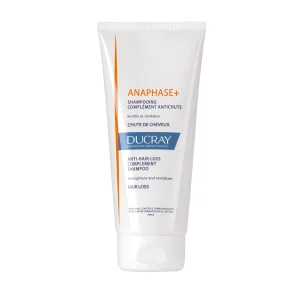
Have you ever wondered what’s in your shampoo? A shampoo is a very popular product used by almost everyone, but there is a misconception that all shampoos are the same. In fact, the ingredients in shampoos can vary from brand to brand. Some ingredients can help make your hair healthier and shinier, while others can damage it and cause it to fall out. The purpose of this article is to identify the ingredients in anti-hair loss shampoos and discuss their effects on hair with the help of the dermatologist Dr. Makram Alwaez. Let’s get to the root of the problem!
What is the hair growth cycle?
Your hair is constantly renewing itself. A single hair emerges, grows, and then falls out, in a hair cycle that takes place in three stages:
1- The anagen phase
The anagen phase, or growth phase, lasts about 2 to 3 years in men and 6 to 8 years in women. Under normal conditions, about 85% of your hair is in the anagen phase. During this phase, the vascular network that feeds the hair root is particularly well developed around the follicle.
2- The catagen phase
The catagen phase, or regression phase, is quite short (2 to 3 weeks), during which the hair follicle becomes inactive.
3- The telogen phase
In this resting phase, the hair is eliminated and replaced by another hair. A new anagen phase then begins. This renewal period lasts about 3 months and explains why we normally lose about 100 hairs per day.
What are the different types of hair thinning?
1- Reactive hair thinning
What you need to know
Sudden, temporary thinning of the hair usually becomes visible two to three months after a specific event, which causes the hair to suddenly enter the falling phase before completing the growing phase. This type of hair thinning is more common in women and can cause sudden thinning all over the head.
Potential triggers
- Stress or emotional shock
- A restricted or inadequate diet
- Fatigue
- Childbirth
- An illness
- Medication
- Over-treated hair
- Scalp tension due to excessive styling
Underlying causes
Reactive thinning hair has three underlying causes. Since it can be difficult to determine which one is primarily responsible, it is best to treat all hair loss causes.
- Vascular deficiency: Poor blood flow to the hair follicles limits the availability of nutrients necessary for healthy hair growth.
- Nutritional deficiency: Nutrients essential for hair growth are either limited or completely absent.
- Inflammation: Cellular stress releases molecules that trigger premature hair loss.
2- Progressive thinning of hair
What you need to know
Hereditary and hormonal hair thinning often takes up to six months to manifest itself, and is usually predetermined by genetics. This type of hair thinning usually follows a pattern, which is different in women and men. In women, there is usually a widening of the parting and thinning patches, while in men, thinning occurs along the hairline and on the crown of the head.
Underlying causes
Progressive thinning has three main underlying causes. Since it can be difficult to determine which one is primarily responsible, it is best to treat them all.
- Vascular deficiency: Poor blood supply to the hair follicles limits the availability of nutrients necessary for healthy hair.
- Hormones: Excessive sebum production is linked to testosterone, and a by-product of testosterone production, DHT, has been found to disrupt the hair growth cycle.
- Tissue deficiency: Collagen and elastin play a role in hair retention by the scalp, but when these structural proteins are compromised, hair becomes thinner.
How does anti-hair loss shampoo work?
Regardless of the cause of your hair loss, anti-hair loss shampoos help improve the appearance of your hair. In some cases, they even help increase hair growth. According to Dr. Makram Alwaez, an anti-hair loss shampoo is excellent for nourishing and revitalizing your scalp. “Healthy hair starts with the scalp,” he notes.
Many commercial shampoos don’t help with hair loss. In fact, some even contain ingredients that worsen hair thinning. By opting for an anti- hair loss shampoo, you can avoid these harmful ingredients.
So what ingredients should you avoid when buying a shampoo to prevent hair loss? Beware of the following ingredients:
- Sodium Lauryl Sulfate (SLS)
Many commercial shampoos contain SLS, a chemical detergent and harsh surfactant. SLS strips hair and scalp of their natural protective oils, which can make hair dry and brittle and scalp dry and irritated.
- Parabens
Shampoo manufacturers often add to their formulations a group of preservatives called parabens to increase shelf life. However, like SLS, parabens may irritate the scalp and even trigger allergic reactions. Stay away from any anti-hair loss shampoo that contains this ingredient!
- Sulfur
It’s important to avoid shampoos that contain sulfur, which can make your hair loss worse. Sulfur allows shampoos to lather well, but it strips your scalp of its oils, which dries and breaks your hair leading to thinning hair.
- Caffeine and herbs
Avoid shampoos that contain caffeine and other herbs. Caffeine causes vasoconstriction and limits blood flow. Keep in mind that for healthy hair growth, it’s important to promote healthy blood flow to the hair root to provide oxygen and nutrients.
Here is our pick for the best anti-hair loss shampoo.
Ducray Anaphase + Anti-Hair Loss Complement Shampoo
FAQs
Can depression cause hair loss?
Depression may play a more indirect role in thinning hair. And, of course, a sudden or significant increase in hair loss can easily create a new source of stress. Dr. Makram Alwaez notes that hair loss in this case will be reversible.
Can hair loss due to vitamin deficiency be reversed?
According to Dr. Makram Alwaez, it is possible if the patient takes the optimal amount of multivitamins and minerals per day.
Can IBS cause hair loss?
Gut health is closely linked to overall health, including immune system health and hormone balance. It also plays an essential role in supporting and regulating healthy hair growth.
Can diabetes cause hair loss?
Dr. Makram Alwaez says that uncontrolled diabetes, where blood sugar levels remain high for long periods of time, can damage the small blood vessels in the scalp and cause hair loss.
In short…
Hair loss is more common than you think and can happen to anyone for a multitude of reasons – from genetics to stress and even the excessive use of hot tools like your regular flat iron. But the good news is that if you are one of the millions of people who suffer from hair loss, there are ways to treat it. In addition to using hair growth vitamins and lotions, anti-hair loss shampoos can actually help regrow thinning sections, add density to fine hair and prevent thinning in the first place.










